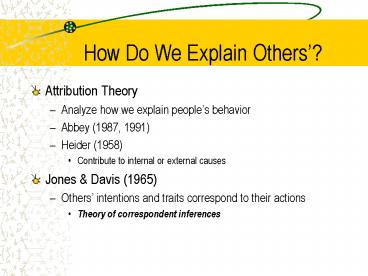How Do We Explain Others - PowerPoint PPT Presentation
1 / 11
Title:
How Do We Explain Others
Description:
Ignore alternate explanations once we identify one or two ... 'We hear and apprehend only what we already half know.' Henry David Thoreau. Belief Perseverance ... – PowerPoint PPT presentation
Number of Views:34
Avg rating:3.0/5.0
Title: How Do We Explain Others
1
How Do We Explain Others?
- Attribution Theory
- Analyze how we explain peoples behavior
- Abbey (1987, 1991)
- Heider (1958)
- Contribute to internal or external causes
- Jones Davis (1965)
- Others intentions and traits correspond to their
actions - Theory of correspondent inferences
2
It Makes Sense, Doesnt It?
- Use consistency, distinctiveness, and consensus
- Ignore alternate explanations once we identify
one or two potential causes
3
How Do We Combine The Information?
- Traits that are personally relevant or important
- First impressions matter!!
- Focus on negative information
4
Fundamental Attribution Error
- Attribution bias
- Underestimating situational influences and
overestimating dispositional influences - Stronger when it serves our self-interest
5
So, Why Do We Do This?
- Actor-observer difference
- Perspectives change over time
- Self-awareness
- Cultural differences
6
Perception and Interpretation of Events
- We hear and apprehend only what we already half
know. Henry David Thoreau - Belief Perseverance
- Persistence of beliefs ever after the
discrediting of the evidence that caused the
belief
7
Are Our Memories Accurate?
- We construct memories at the time of withdrawal.
- Rosy retrospection
- Our memories improve our behavior.
- Misinformation effect
- Incorporating misinformation into memory of
event once receiving misleading information about
it - Priming
- Activating particular associations in memory
8
Do We Really Need To Think At All?
- Our intuition is powerful..and adaptive.
- Not fool-proof and, actually, not that reliable.
- Overconfidence phenomenon
- Tendency to be more confident than correct
- Confirmation bias
- Tendency to search for information that confirms
preconceptions
9
Increasing Our Mental Speed?
- Heuristics
- Simple, efficient thinking strategies
- Three forms
- Representativeness
- Availability
- Counterfactual thinking
10
Order, Order!!!
- Illusory correlation
- Perception of a relationship where none exists or
a stronger relationship than truly exists - Illusion of control
- Idea that uncontrollable events can be controlled
by us - Regression toward the average
- Statistical tendency for extreme scores or
behavior to return toward the average
11
How Do You Feel?
- Our moods strongly influence our judgments.
- Self-fulfilling Beliefs
- Perceptions can subtly influence reality.
- Teachers and students
- Behavioral confirmation































